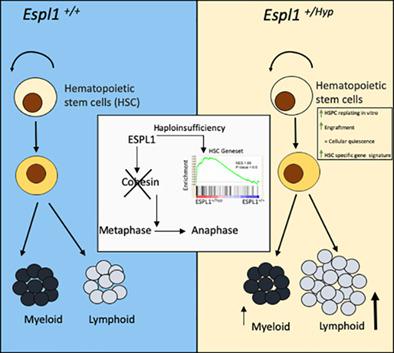当前位置:
X-MOL 学术
›
STEM CELLS
›
论文详情
Our official English website, www.x-mol.net, welcomes your
feedback! (Note: you will need to create a separate account there.)
Haploinsufficiency of cohesin protease, Separase, promotes regeneration of hematopoietic stem cells in mice
STEM CELLS ( IF 4.0 ) Pub Date : 2020-10-03 , DOI: 10.1002/stem.3280 Praveen Kumar 1, 2 , Haizi Cheng 1, 2 , Samridhdi Paudyal 1, 2 , Lanelle V Nakamura 1, 2 , Nenggang Zhang 1, 2 , Jessica T Li 1, 2 , Rajkumar Sasidharan 3 , Mira Jeong 4 , Debananda Pati 1, 2, 5
STEM CELLS ( IF 4.0 ) Pub Date : 2020-10-03 , DOI: 10.1002/stem.3280 Praveen Kumar 1, 2 , Haizi Cheng 1, 2 , Samridhdi Paudyal 1, 2 , Lanelle V Nakamura 1, 2 , Nenggang Zhang 1, 2 , Jessica T Li 1, 2 , Rajkumar Sasidharan 3 , Mira Jeong 4 , Debananda Pati 1, 2, 5
Affiliation

|
Cohesin recently emerged as a new regulator of hematopoiesis and leukemia. In addition to cohesin, whether proteins that regulate cohesin's function have any direct role in hematopoiesis and hematologic diseases has not been fully examined. Separase, encoded by the ESPL1 gene, is an important regulator of cohesin's function. Canonically, protease activity of Separase resolves sister chromatid cohesion by cleaving cohesin subunit‐Rad21 at the onset of anaphase. Using a Separase haploinsufficient mouse model, we have uncovered a novel role of Separase in hematopoiesis. We report that partial disruption of Separase distinctly alters the functional characteristics of hematopoietic stem/progenitor cells (HSPCs). Although analyses of peripheral blood and bone marrow of Espl1+/Hyp mice broadly displayed unperturbed hematopoietic parameters during normal hematopoiesis, further probing of the composition of early hematopoietic cells in Espl1+/Hyp bone marrow revealed a mild reduction in the frequencies of the Lin−Sca1+Kit− (LSK) or LSK CD48+CD150− multipotent hematopoietic progenitors population without a significant change in either long‐term or short‐term hematopoietic stem cells (HSCs) subsets at steady state. Surprisingly, however, we found that Separase haploinsufficiency promotes regeneration activity of HSCs in serial in vivo repopulation assays. In vitro colony formation assays also revealed an enhanced serial replating capacity of hematopoietic progenitors isolated from Espl1+/Hyp mice. Microarray analysis of differentially expressed genes showed that Separase haploinsufficiency in HSCs (SP‐KSL) leads to enrichment of gene signatures that are upregulated in HSCs compared to committed progenitors and mature cells. Taken together, our findings demonstrate a key role of Separase in promoting hematopoietic regeneration of HSCs.
中文翻译:

粘连蛋白分离酶单倍体不足促进小鼠造血干细胞再生
最近,粘连蛋白成为造血和白血病的新调节因子。除了粘连蛋白之外,调节粘连蛋白功能的蛋白质是否在造血和血液疾病中具有直接作用尚未得到充分研究。分离酶由 ESPL1 基因编码,是粘连蛋白功能的重要调节因子。通常,Separase 的蛋白酶活性通过在后期开始时裂解粘连蛋白亚基 Rad21 来解决姐妹染色单体的粘连。使用分离酶单倍体不足的小鼠模型,我们发现了分离酶在造血中的新作用。我们报告,Separase 的部分破坏明显改变了造血干/祖细胞 (HSPC) 的功能特征。尽管对 Espl1+/Hyp 小鼠的外周血和骨髓的分析广泛显示正常造血期间未受干扰的造血参数,但对 Espl1+/Hyp 骨髓中早期造血细胞的组成的进一步探测揭示了 Lin−Sca1+ 频率的轻度降低Kit− (LSK) 或 LSK CD48+CD150− 多能造血祖细胞群在稳态下长期或短期造血干细胞 (HSC) 亚群没有显着变化。然而,令人惊讶的是,我们发现分离酶单倍体不足在连续体内再增殖测定中促进 HSC 的再生活性。体外集落形成测定还揭示了从 Espl1+/Hyp 小鼠中分离的造血祖细胞的连续重铺能力增强。差异表达基因的微阵列分析表明,HSC 中的分离酶单倍体不足 (SP-KSL) 导致 HSC 中与定型祖细胞和成熟细胞相比上调的基因特征富集。 综上所述,我们的研究结果证明了分离酶在促进 HSC 造血再生中的关键作用。
更新日期:2020-10-03
中文翻译:

粘连蛋白分离酶单倍体不足促进小鼠造血干细胞再生
最近,粘连蛋白成为造血和白血病的新调节因子。除了粘连蛋白之外,调节粘连蛋白功能的蛋白质是否在造血和血液疾病中具有直接作用尚未得到充分研究。分离酶由 ESPL1 基因编码,是粘连蛋白功能的重要调节因子。通常,Separase 的蛋白酶活性通过在后期开始时裂解粘连蛋白亚基 Rad21 来解决姐妹染色单体的粘连。使用分离酶单倍体不足的小鼠模型,我们发现了分离酶在造血中的新作用。我们报告,Separase 的部分破坏明显改变了造血干/祖细胞 (HSPC) 的功能特征。尽管对 Espl1+/Hyp 小鼠的外周血和骨髓的分析广泛显示正常造血期间未受干扰的造血参数,但对 Espl1+/Hyp 骨髓中早期造血细胞的组成的进一步探测揭示了 Lin−Sca1+ 频率的轻度降低Kit− (LSK) 或 LSK CD48+CD150− 多能造血祖细胞群在稳态下长期或短期造血干细胞 (HSC) 亚群没有显着变化。然而,令人惊讶的是,我们发现分离酶单倍体不足在连续体内再增殖测定中促进 HSC 的再生活性。体外集落形成测定还揭示了从 Espl1+/Hyp 小鼠中分离的造血祖细胞的连续重铺能力增强。差异表达基因的微阵列分析表明,HSC 中的分离酶单倍体不足 (SP-KSL) 导致 HSC 中与定型祖细胞和成熟细胞相比上调的基因特征富集。 综上所述,我们的研究结果证明了分离酶在促进 HSC 造血再生中的关键作用。









































 京公网安备 11010802027423号
京公网安备 11010802027423号